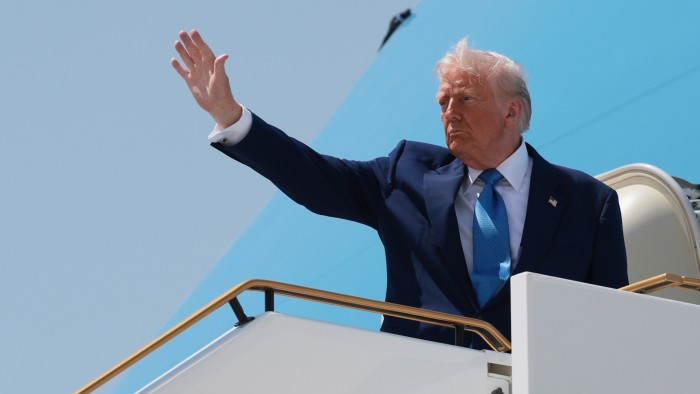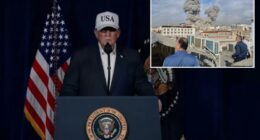Share this @internewscast.com
Unlock the White House Watch newsletter for free
Donald Trump wrapped up his assertive tour of the Middle East only to confront domestic issues upon his return on Friday. As he made his way back, he faced a downgrade in the nation’s credit rating, disappointing data on consumer sentiment, and obstacles to his signature tax plan.
In the preceding two weeks, Trump experienced a boost in his approval ratings, and stock markets rebounded strongly after he decided to halt some of the aggressive import tariffs he had announced in early April. Positive data on the labor market and inflation also brought relief, alleviating fears of a possible sharp economic downturn or recession.
However, while Trump was traveling back to Washington from Abu Dhabi on Air Force One, Moody’s downgraded the US from its premier triple-A credit rating due to concerns over increasing government debt levels.
Earlier in the day, the University of Michigan’s closely watched survey of consumer sentiment showed confidence had dropped to its second-lowest level on record, as people’s expectations of inflation soared.
And shortly afterwards, Trump suffered a setback on Capitol Hill when conservative hardliners on the US House budget committee voted against his biggest domestic legislative goal: a sweeping bill to extend tax cuts he enacted in 2017 and enact deep government spending cuts.
The tricky politics are a comedown from the multibillion dollar economic partnership pacts and investment deals signed during the president’s tour of Saudi Arabia, Qatar and the United Arab Emirates this week.
Accompanied by phalanx of business leaders led by Elon Musk as well as top cabinet officials including Scott Bessent, the US Treasury secretary, and Howard Lutnick, the commerce secretary, a buoyant Trump saw the lucrative agreements as a vote of confidence in the American economy.
“It’s the new industrial revolution, and it’s driven by Donald Trump and it’s going to be amazing jobs for Americans,” Lutnick told Fox News in an interview from the UAE.
Back in Washington, Trump is counting on passage of what he calls the “big beautiful bill” to ease some of the hit to households and businesses from the president’s new tariffs — and restore confidence in his stewardship of the economy.
The fate of the tax bill is increasingly taking centre stage in Washington as Trump and Republican leaders in the lower chamber of Congress rally their slim majority to approve the legislation.
But on Friday there was a big setback to its progress when it failed to advance in the House budget committee.
South Carolina Republican Ralph Norman, who was one of the group that opposed the bill, said: “If we’re going to continue to have . . . able-bodied Americans getting checks, illegals getting checks, subsidies that go to corporations that shouldn’t get them — I’m out.”
Soon after the vote, Trump posted on X: “Republicans MUST UNITE behind, ‘THE ONE, BIG BEAUTIFUL BILL!’“. “We don’t need ‘GRANDSTANDERS’ in the Republican Party. STOP TALKING, AND GET IT DONE!”.
Meanwhile, moderate Republicans in battleground districts are insisting on more generous tax deductions for state and local tax payments, know as “Salt”, another sticking point that the president will have to find a way through.
Even if the deadlock is broken on Capitol Hill, fiscal hawks have warned that the implications for US public finances could be disturbing.
The Committee for a Responsible Federal Budget, a bipartisan group, warned on Friday that the legislation would add $3.3tn to US debt over a decade, and risks spooking bond investors in a similar way to the UK budget crisis of 2022.
“The US’ current fiscal situation is worse than the United Kingdom’s was, and the deficit impact of the package currently under consideration is even larger than the Truss package. The markets may not take too kindly to this,” the CRFB said in a post.
Friday’s dire consumer sentiment data did not reflect the impact of the agreement by the US and China in Switzerland at the beginning of the week to de-escalate their trade war and bring down the tit-for-tat tariffs they had slapped on each other since early April.
But Walmart, the world’s largest retailer, warned this week that it would have to raise prices in its stores despite the US-China détente, and economists said the faltering consumer sentiment was an additional sign that anxiety about Trump’s trade policies remains high.
A polling average by RealClearPolitics this week found that 50.1 per cent of Americans disapprove of Trump’s performance as president, while 46.1 per cent approve.
While the 4 percentage point deficit is narrower than the 7.1 point deficit in approval he had at the end of April, it’s a big drop from the 6 percentage point advantage he posted in January at the start of his second term.
“Fears over the inflationary impacts of tariffs remained the largest source of pessimism for consumers, even as recent talks to roll back some tariffs led to a substantial recovery for equity markets,” Oxford Economics wrote in a note on Friday.
It added: “Consumers have also become more worried about their personal finances and are expecting a weakening in income growth.”










